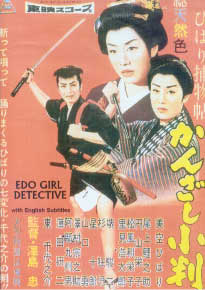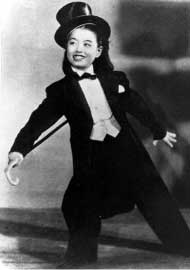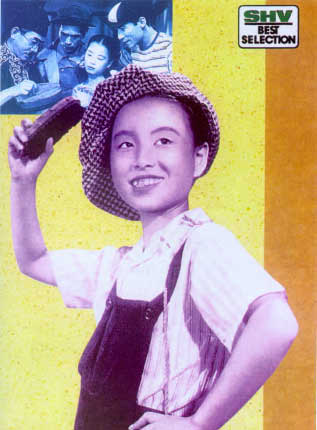Edo Girl Detective (Hibari
Torimonocho)

Director: Sawashima Tadashi
Year: 1958
Production Company: Toei
Running Time: 85 minutes
A small attractive woman with thick manicured eyebrows that slope downward
like rushing trains on course for a head on collision and finely cut eyes
that sparkle with humorous grace begins to sing while encased in her traditional
kimono. One might expect a high-pitched feminine vocal to come out of the
mouth of this petite woman but instead comes a deep tremulous bluesy sound
that feels as if it originated from the bottom of a gin bottle deep inside
her. It carries the pain of every damaged heart and every broken promise
in its melody. It feels as if the song should be sung under the dim lights
of a street lamp waiting for another lonely night to pass. The singer is
Hibari Misora and the style is Enka. Many have termed Hibari as “Japan’s
Greatest Entertainer of the Twentieth Century” and Enka was a form of music
that contained the collective angst of the country.

The music reminds me of the tragic tone of Edith Piaf and though the two
singers were physically continents apart their styles were formed in the
desperate times of post WWII. Hibari was born in Yokohama in 1937 and came
of age in the post war ruins. Her father was a fish seller and possibly unknown
to many of her later fans was her partial Korean ancestry on her grandfather’s
side. Her mother was intent in getting Hibari into show business and the
girl showed inordinate talent at a very young age. At the age of nine she
appeared in a talent show and stunned the audience with her grown up world
weary voice though the judges considered her a near aberrant life form and
were almost suspicious that there must be some slight of hand going on –
no small girl could really sing like this.

Three years later she cut her first album with Nippon Columbia – the record
label she was to stick with over her career – and debuted in her first movie,
“Sad Whistle” (Kanashiki Kuchibue) in which she plays an orphan looking for
her lost brother. The song “Sad Whistle” was released and sold 450,000 copies
and she was an overnight star at twelve years old. The next year she was
in “Tokyo Kid” in which she sings some of her trademark lyrics “I have dreams
in my right pocket, chewing gum in my left pocket”. At a concert in 1956
the audience madly rushed in for seats and ten people were killed in the
process. A year later a young female fan threw acid on Hibari’s face because
she wanted her idol to be more “normal”, but Hibari recovered with only minor
injuries (a fellow actor next to her was not so lucky and was blinded).

Her songs spoke to the tough times that Japan was going through and she quickly
became enormously popular with an overwhelming output of songs, movies, concerts
and TV appearances. Over her career she was to make around 150 films and
300 records (some 1,400 songs) and became the highest paid entertainer in
Japan during the fifties. This was a driven life propelled to a large degree
by her mother who was a constant presence and a simple need to be successful.
Her life was show business and she appears to have had left little time for
her private life. She was married for two years to actor Akira Kobayashi,
but it didn’t work out and after being divorced in 1964 she never remarried.
As musical taste began to change in the late 1960’s and 70’s with the emergence
of the J-Pop sound, her songs lost their popularity among the new generation,
but her fans from the past stayed fiercely loyal to her. When she died in
1989 at the age of 52 her funeral procession was attended by thousands of
mourners.

I am not sure where “Edo Girl Detective” falls in terms of importance in
Hibari’s film career – but it is a charming if slight affair and certainly
gives Hibari lots of opportunity to display her skills as she sings and fights
with equal élan. The character she plays is Oshichi – or at least
that is the name she goes by. In truth she is a princess but finds life behind
the protection of her brother and the high walls to be quite dull so she
takes on another identity and lives in a small cozy house with her comic
relief assistant Gorohachi and pretends to be a singer. She also likes to
think of herself as a girl detective – an Edo version of Nancy Drew – and
so when a young woman is murdered after a singing contest Oshichi decides
to investigate. She soon runs into a group of samurai who warn her to keep
her nose out of the affair, but she tells Gorohachi that she has to continue
because “I’m a detective, I can’t back down”.

When a large force of samurai surround her, she takes out her short sword
and fends them off until Sasaki (Azuma Chiyonosuke), a sleepy eyed alcohol
imbibing ronin, gives her a hand – for a price. He wants payment per kill
and as she later cheerfully tells him “I owe you for forty now”. Another
woman is killed and Oshichi begins to track back the trail to a robbery of
three golden hairpins four years previously from the Matsunaga Clan. To enable
her sleuthing she takes on various disguises – as a man, a geisha, a fencing
student, a royal lady in waiting and a kabuki performer – all these giving
Hibari a chance to have some fun and show her range. The film rarely pauses
and when it does it’s usually for a song – one of the best being a drunken
pal song between Oshichi and Sasaki – and for me it was a nice light introduction
to this legendary performer.

My rating for the film: 7.0

Tokyo Kid








